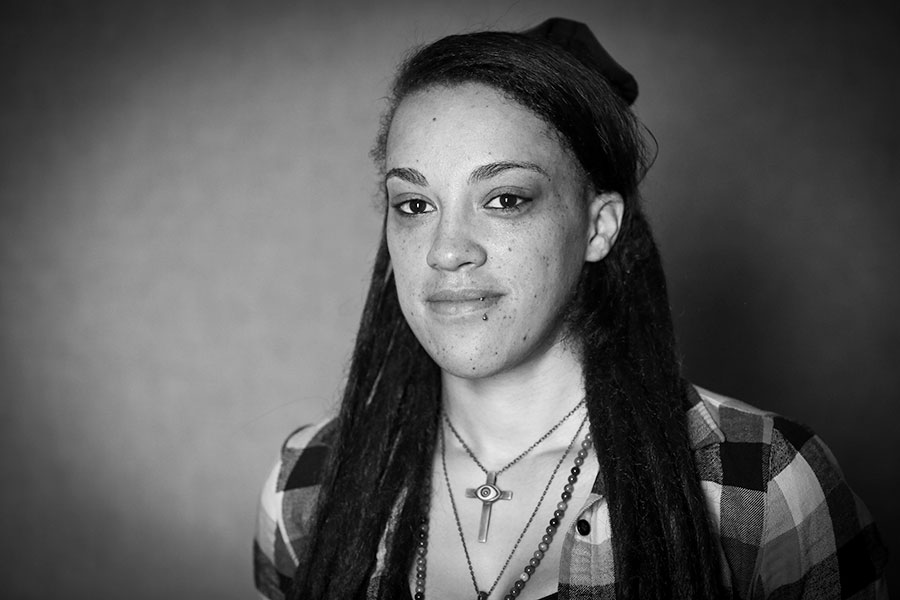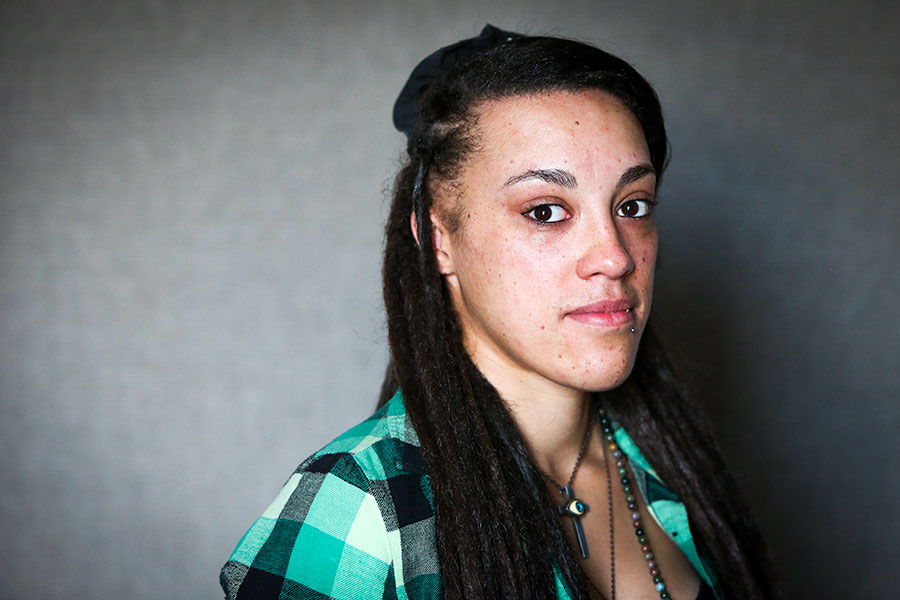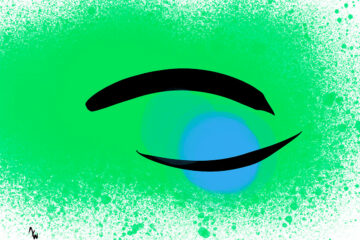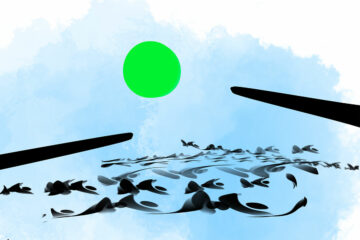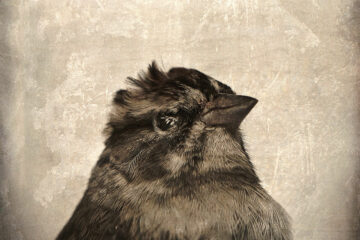Humanitou hosted a pop-up event during Arts Month as part of ArtPOP, a local-arts series supported by the Pikes Peak Arts Council and the Cultural Office of the Pikes Peak Region. Participants shared stories and were photographed during 30-minute sessions. The conversation below is one of seven in the Humanitou ArtPOP series.
Kitty Harris is an artist, and is the founder of Secret Stash Yoga, a cannabis-optional yoga studio in Colorado Springs.
When Kitty, 29, sat with Humanitou, she shared about her ongoing journey of self-empowerment, of coming into her own.
The path has wound through nursing school, studying art and yoga, and standing up as a cannabis activist. It brought a reckoning with herself and a short stint in jail.
What has emerged is a vulnerable and courageous voice, a leader within a community.
Meet Kitty Harris.
Humanitou: When you applied to be part of this Humanitou ArtPOP experience, you talked about the cross-section of yoga, art, vulnerability and what you describe as your journey of finding your power. What does all that mean to you?
Kitty: When I think of vulnerability, I think of how people are constantly hiding pieces of themselves. They’re always looking to fit into a box that society has kind of placed on them.
When I started going to college, my major was nursing. Nurses are always in demand. I can work at a hospital. This is what society says I should do. It’s going to set me up.
So I started going down that road and doing all these things that everybody else wanted me to do, and pushing down pieces of me that I really enjoyed just to fit in. Over time, I began to feel the resistance of not following my passions.
I had to get comfortable with standing in what I knew. I could talk about art all day. When it came to other subjects, like nursing or working in the places I have worked, I hated talking about it. I dreaded it. It’s not something I was confident in talking about.
Over time, like I said, I began to feel that resistance. And I had a year, in 2015, that was really tough for me. I lost some people to suicide, I ended a very unhealthy relationship, and I started to realize that life is too short.
I figured if there wasn’t something here for me, I could find it and make a trail for somebody else to follow, if there wasn’t one for me to follow. That led me into becoming more of an activist in certain areas of my life, with art, with yoga, and with cannabis.
I decided to jump all in and find the community, find the people that are like me. I stood and was one of the first people to go, “I like to smoke weed and I like to paint and I like to do yoga, who wants to come hang out with me?” I got a lot more response than I was expecting.
I still get nervous talking about my cannabis use. I get so nervous talking about it, because it’s a drug and you had to hide these things about yourself. So I got used to hiding it.
But the more I was open about it, the more it attracted like-minded people, and people were willing to share their story with me. I met a lot of people through art and through yoga and through cannabis.
I feel bad when I talk about my story, because most of the cannabis stories are like people who have very severe elements: cancer, chronic disease, chronic pain, things like that. Mine was I had insomnia. I couldn’t sleep and that affects your health all around. So it wasn’t as severe, but it still helped me.
It opened the door for me to be friends with other people that were hiding this part of themselves, too, to show them it’s OK, that there are normal people out there.
That’s what I’m trying to do in sharing my story.
Humanitou: My 9-year-old son asked me if marijuana is a medicine the other day. I gave him a brief history of how it’s been a political tool of fear and about the war on drugs. I talked about how perceptions are changing, and how, yeah, it’s often used as a medicine.
The fascinating thing to me was how we’ve reached a generational point where his first question was about it as something useful, rather than as something criminal or detrimental.
Kitty: Yes. And I think more people should be open to talking about it with their kids. The conversation and the words that we choose to use to speak about this are starting to change.
Like you said, it’ll start to change from generation to generation. My generation, I guess, is debunking, rewording all the stuff the other generations put on top of us.
I was angry. I was upset. I was messing things up. Fresh out of college and no more sports, no more school. I didn’t know who I was and I wasn’t interested in finding out, either.
The more we are open about it and non-judgmental, and it doesn’t have to be just about cannabis, more and more people will stop hiding pieces of themselves, and stop being afraid of asking questions. They are going to learn.
The more you learn, the more you’re able to navigate in your world.
Humanitou: It can be a long journey to unlearn all those “shoulds” you’re talking about. I think we all go through it. Maybe not all figure it out, either. I’d say you’re taking important steps in recognizing your authenticity, your own power. What have you learned about that process, and where do you think you are in it now?
Kitty: It’s a never ending process. I definitely feel myself growing and learning everyday. When it comes to my authenticity and vulnerability — and it goes back to the judgment thing — I’m starting to realize that people have their own thoughts, their own conditioned beliefs, and you can’t let that affect you. You can’t let that stick to you.
I’m starting to learn that there are people who will like me and people who will not like me. I guess, basically, no matter what is going on in anybody else’s life, as long as your center is solid, and I don’t want to say, know who you are, because I’m still learning who I am, but it’s trial and error.
You start to realize what fits and doesn’t fit the more you try it on, the more you try things out. By discovering what you don’t like helps you to figure out what you do like.
It’s interesting, too, because I think I’ve always known. I’ve always been creative. I’ve always had this piece of me that’s been around and it’s, basically, waking up to that.
You have to go through society and hear others’ opinions, and you care and you’re an empath, and all these things, but ultimately, whoever you are, whatever your purpose is, whatever your why is, has always been there. It’s just up to us to uncover it.
When it came to me uncovering who I am, when it came to all these things and my family being involved … My family has always been supportive. I’ve the fourth out of six kids, so there are a lot of us.
My mom and stepdad, who I consider my dad, had a lot of kids with a lot of different personalities and interests that they had to balance. I am thankful.
Even though they were, like, “You should do nursing. This is more practical,” they were doing that out of love. They thought this was the best interest for me at the time. I don’t penalize them for wanting the best for me. I think they understand that I tried and that it didn’t work.
As I started to come into this groove of things that I like, they noticed a difference in me, my behavior, me being happy. Now, my family is behind me 100 percent. They know this is not a game; this is my life.
I think a lot of people have that moment in life where they start to question their reality and what’s in it, who’s in it, and where they’re going. That moment is a very important moment.
They are my unit and love me unconditionally, through jail time to pot to art, and whatever I choose to do next. They will be there for me. I think that’s important for people when it comes to vulnerability and being authentic.
I’ve been blessed to have a family like this. Not a lot of people have that support system, that base. But what I want to encourage is just because you don’t have a brother or a sister like this, doesn’t mean you don’t have a community that can be that base for you.
I think that it’s intimidating to do all these things alone. But when you start to stand in your own, you start to attract other people that become a rock for you. They’re standing behind you.
Humanitou: You mentioned community before. That’s who stands with us, whether family by blood or not, right? … And I want to ask about “jail time.” You mean that literally, as in an experience in your own life?
Kitty: Yes. When I turned 21, I was having fun. I got a DUI going home.
I got in a lot of trouble for it. A couple months later, I also got a domestic violence charge. We were not good to each other. He’s not to blame and I’m not to blame; we’re both to blame. We both did things to each other that we probably shouldn’t. It was volatile. I was young. I got a charge for that.
I ended up on probation for two years for both of those things. I was being drug tested for alcohol, for marijuana, for everything. Along this time, my passion and starting to realize I liked art came into play. I needed an outlet.
I was angry. I was upset. I was messing things up. Fresh out of college and no more sports, no more school. I was just hanging out with friends. I didn’t know who I was and I wasn’t interested in finding out, either. I thought the things I was doing were all right, I guess.
I had a couple months left of probation and I couldn’t afford it. You have to pay for all that. You pay to see your probation officer. You pay for all the drug tests. They pop you whenever they want, and I had to pay every time for that. I had to pay for all the classes. I couldn’t pay for it all, and I reached a breaking point.
I said, “I can’t do this anymore. I’ll just do my time. What can we do?”
My 24th birthday is when that happened. I spent my 24th birthday in jail. I was in jail for a month.
Humanitou: This sounds like a pivotal time in your life. How has that experienced helped to shape your life, your perspective since?
Kitty: It was a time full of anger. It was a time full of confusion, of lost identity, not knowing who I was. I think getting in trouble with the law and being the one out of all my friends who was the person to do that, began to make me start questioning things.
That questioning, that’s what put me on the path to saying, “That’s not what I want to do.” By doing all that stuff and not knowing, you began to question who you really are.
Why am I doing this? Why am I in this city? Why am I doing this job? What do I really like to do?
And then when I felt like I had the answers for the questions, I thought: What can I do? What is the action that I can take to change my situation?
That’s what everybody would always say to me, “If you’re unhappy in your situation, change something. Tweak something. Change one thing.”
So I slowly started to do that. I changed my job. I wanted to do art, so I started to look into art-related jobs. I wanted to put myself out there more, so I started walking into coffee shops and going, “Hey, you have a really nice empty wall. Would you like to put a painting up there?”
I started to take the actions after the questions I was forced, in a way, to ask myself. Well, I don’t want to say forced, but I put it upon myself to do.
I think a lot of people have that moment in life where they start to question their reality and what’s in it, who’s in it, and where they’re going. That moment is a very important moment.
It’s the determining factor in what you’re going to choose to do next. It will lead you there. I think once I took that action to start doing what was related to it, I started seeing results. “Oh, they do want to hang my art up. Oh, I’m in a gallery now. I’m teaching art classes. What else can I do that I love to do?”
You keep asking those questions and you keep finding the actions you can take.
I think being angry and finding my outlet in my art has definitely boosted my confidence in being able to speak to people about yoga and about cannabis. And my art is definitely where I get my vulnerability and my authenticity from.
I hope with all the stuff that I’m trying to do that people start to question themselves and what they really want to do, who they really want to be, and who they think they really are and what they like. And then try it on, like shoes. If they don’t fit, then find the right size.
